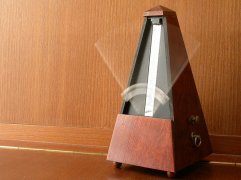Karl King; The March King of Circus Music (1891-1971)
By Jo Ann VickKarl Lawrence King, the renowned American composer and conductor, made an indelible mark on the world of circus music during the early to mid-20th century. Born on February 21, 1891, in Paintersville, Ohio, King's musical journey would take him from the circus tent to the concert hall, solidifying his reputation as one of the most influential figures in the realm of American band music.
Early Years and Musical Roots
Karl King's early exposure to music can be traced back to his childhood in Xenia, Ohio. His father, John King, was a musician and bandleader, providing Karl with his initial musical education. By the age of 11, Karl King was proficient enough on the cornet to join his father's band, marking the beginning of his lifelong dedication to music.King's family moved to Canton, Ohio, where he continued to develop his musical skills and gained valuable experience playing in local bands. His passion for music led him to pursue formal education at the Dana Musical Institute in Warren, Ohio, where he studied cornet and composition. The foundation laid during these formative years would later serve as the springboard for his prolific career in the world of band music.
Circus Bands and the Golden Age of the American Circus
Karl King's introduction to the world of circus music occurred in 1910 when he joined Robinson Famous Shows, a traveling circus. He played cornet and later became the band's conductor. The circus, with its lively and colorful atmosphere, provided King with a unique platform to experiment with and refine his compositional skills.The Golden Age of the American Circus, spanning the late 19th to the early 20th centuries, was characterized by extravagant parades, dazzling performances, and, of course, the lively music that accompanied the spectacle. Karl King's contributions to this era were significant, and his compositions became synonymous with the energy and excitement of the circus.
Circus Compositions and Legacy
Karl King's catalog of circus music is extensive and includes compositions that have become classics in the genre. One of his most famous marches, "Barnum and Bailey's Favorite," captures the essence of the circus with its rousing melodies and dynamic rhythms. This composition, often referred to as "The Granddaddy of All Circus Marches," reflects King's ability to create music that perfectly complements the spectacle of the big top.Another notable composition, "The Melody Shop," showcases King's versatility as a composer. Written in 1910, the march became immensely popular and remains one of King's most enduring works. Its catchy tunes and playful spirit capture the excitement of a bustling musical emporium.
King's contributions to the circus music genre were not limited to marches. His compositions spanned a range of styles, including waltzes, galops, and novelty pieces. "Circus Days" and "Jolly Corks" are examples of his ability to evoke the whimsical and festive atmosphere of the circus through music.
Return to Civilian Life and Community Bands
After serving in the military during World War I, Karl King returned to civilian life with a wealth of experiences that would shape his musical career. Settling in Fort Dodge, Iowa, King became the conductor of the Fort Dodge Municipal Band in 1920. This marked the beginning of a long and fruitful association with community bands, where King's influence extended beyond the circus tent.Under King's leadership, the Fort Dodge Municipal Band flourished, earning a reputation for excellence. King's dedication to musical education and community engagement became evident as he expanded the band's repertoire and organized free concerts for the public. His impact on community bands extended beyond Fort Dodge, as he contributed to the broader movement of promoting music at the local level.
Composer and Conductor: A Prolific Career
Karl King's career as a composer and conductor was marked by prolific output and artistic innovation. In addition to his contributions to the circus music genre, King composed a diverse range of works for concert bands. His compositions include over 200 marches, galops, waltzes, and other pieces, showcasing his mastery of different musical forms.Some of King's notable concert band compositions include "Hosts of Freedom," "Bridal Chorus," and "The Viking." These works demonstrate King's ability to create music that is both technically challenging for musicians and enjoyable for audiences.
Legacy and Honors
Karl King's legacy is celebrated not only for his contributions to circus music but also for his impact on the broader landscape of American band music. His compositions are still performed by concert bands worldwide, and his influence continues to resonate with musicians and audiences alike.In recognition of his achievements, Karl King was inducted into the American Bandmasters Association in 1931. He also received the Medal of Honor from the Midwest International Band and Orchestra Clinic in 1969. Posthumously, King was awarded the Iowa Governor's Outstanding Artist Award in 1971, and the Karl L. King Bandshell in Fort Dodge stands as a tribute to his enduring legacy.
Karl King's journey from the circus to the concert hall reflects a remarkable career marked by innovation and dedication to musical excellence. As a composer, conductor, and influential figure in the world of band music, King's impact extended beyond the boundaries of the big top. His compositions, characterized by their spirited melodies and dynamic rhythms, capture the essence of the American circus and continue to resonate with audiences worldwide.
Karl King's legacy lives on not only in the notes of his compositions but also in the community bands that continue to perform his music. His contributions to the rich tapestry of American music, particularly in the realm of band music, ensure that he remains a revered figure, forever known as the "March King of Circus Music."
Jo Ann Vick is a private piano instructor with 20 years of training and performing experience
and has a home based studio in Frisco, Texas. Her mission is to develop in others, a love
for playing the piano. Her website is located at www.teachmethepiano.com




